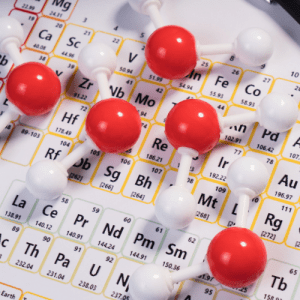Lab coats, experiments and complicated calculations… Physics and chemistry have quite a bit in common. Yet they are two completely different subjects. Read more about it in this blog.
What is the difference between physics and chemistry? In this blog we take a good look at both subjects. We go deeper into the separate courses and also tell you what the differences and similarities are.
Chemistry subject
In chemistry it is mostly about chemical reactions. You investigate processes in which new substances are formed from starting materials. A well-known example is the combustion of natural gas. The substances natural gas and oxygen are converted into carbon dioxide and water. Chemists mainly focus on the smallest particles of the substances concerned: the atoms and molecules. Atoms are the smallest particles that make up substances. Just think of hydrogen or carbon atoms. If you glue a few of those atoms together, a molecule is created. That is still an extremely small particle. For example, a water molecule consists of two hydrogen atoms and an oxygen atom.

Chemistry at school
At school, the subject of chemistry involves both theory and practice. During experiments you link the learned theory to the observations you make. Chemistry experiments at school go further than just throwing together some dust. You look for reactions between the substances and see how much of those substances is needed for such a process. New subject matter in chemistry is often a continuation of the previously discussed subject. It is therefore important that you understand one part well before moving on to the next.
What does a chemist do?
A chemist tries to explain the properties of substances, such as color and conductivity. He does this on the basis of the building blocks of the material. On the other hand, a chemist tries to design molecules that give a substance special properties. Think, for example, of materials that can convert solar energy into electrical energy. Chemistry therefore plays an important role in making our world more sustainable.
The subject of physics
The physics is concerned with studying and describing various phenomena in nature. Think, for example, of electricity, forces, vibrations and waves, radiation, movement and time. The field of physics extends from the study of the largest to that of the smallest. It literally goes from finding out the dimensions of the universe to studying the building blocks of atoms. Mathematics is widely used in physics: a physicist uses mathematics to describe reality.

Physics at school
In physics, too, you are involved in both theory and practice at school. With the help of experiments you learn what physical formulas really mean. Several subjects stand a little more on their own than in chemistry. Mathematics is widely used in physics. That is why it is important that you have sufficient basic knowledge of that profession. And, perhaps most importantly, physics is not just about learning texts and theory. Applying laws and formulas in new situations is the most important skill.
What does a physicist do?
A physicist researches and improves concepts, theories and techniques that revolve around matter, radiation and energy. He does this at the largest possible as well as at the smallest measurable level.
Which part of nature a physicist focuses on depends on his specialization. For example, he can deal with natural disasters, the human body or sustainable energy.
Subjects that return are light, sound, movement and power.
Physics, Chemistry and Biology: A Trinity
Physics and chemistry do not only have differences. There are also points of contact. For example, both courses deal with the properties of fabrics and materials. And with the construction of atoms and molecules. Moreover, both physics and chemistry have overlap with biology . It is not without reason that they all belong to the exact sciences. In chemistry, for example, you look at reactions that occur in cells of organisms. In that case you are talking about biochemistry. Biophysics is the field where physics and biology come together. This movement is concerned with physical principles in biology. Examples are the locomotion of a snake and the strength of a cell skeleton.



Broad knowledge
What also applies to both physics and chemistry is that you acquire a broad knowledge the slot online terbaik within these subjects at school. You can draw on that for the rest of your life.
You really don't have to be a physicist or chemist to benefit from the material learned. Knowledge and skills are also reflected in completely different professions. So take advantage of it!
